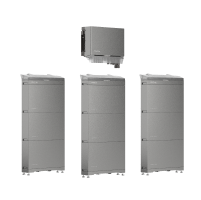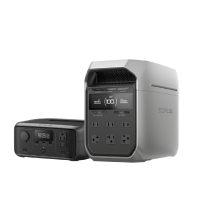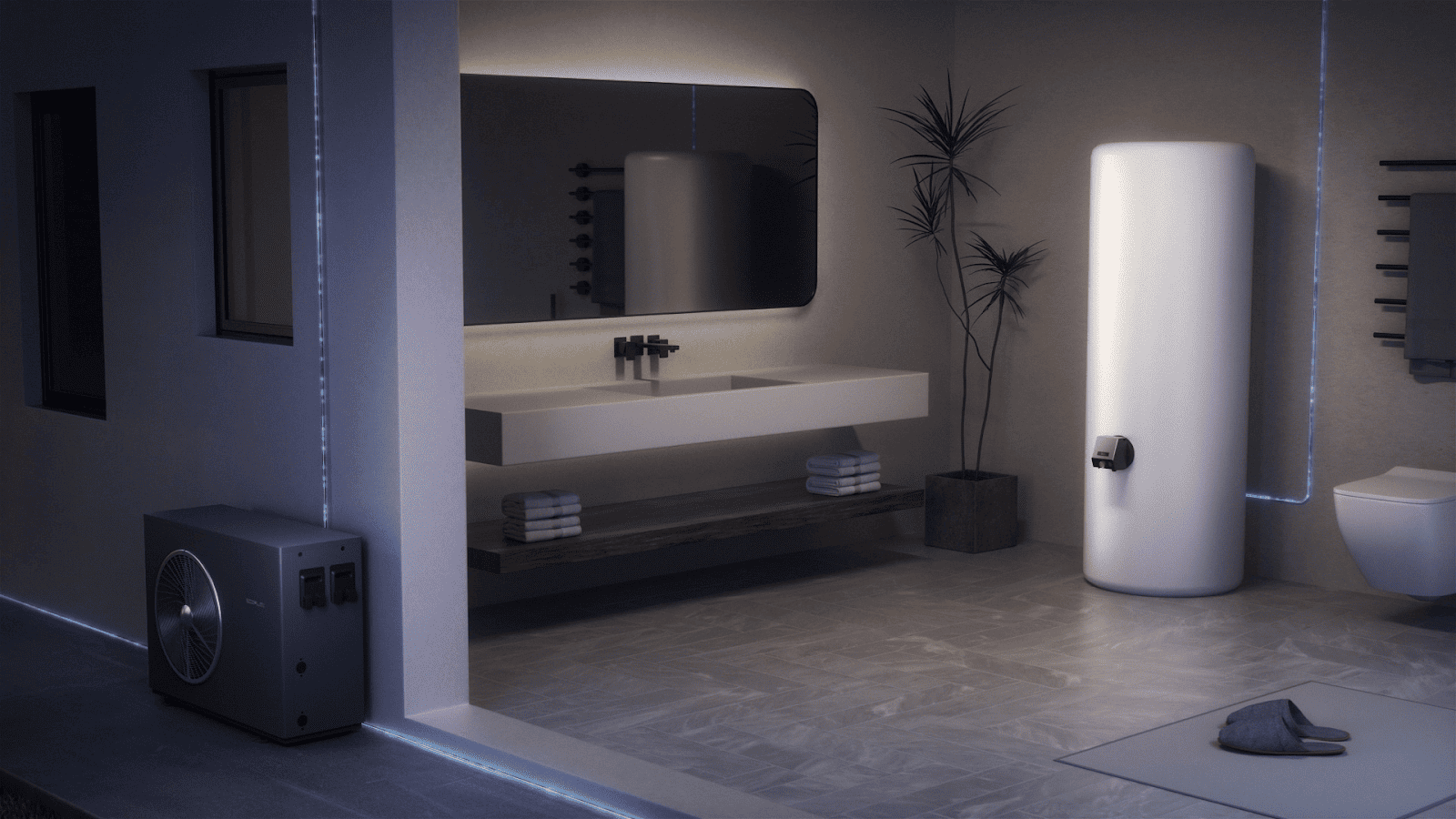Heat Pump Boilers vs.Traditional Gas Boilers: Which Is More Efficient?
Comparing a heat pump boiler with a traditional gas boiler can be complex and confusing, as both work differently. Heat pump boilers are typically more efficient than gas systems, but modern heating systems like EcoFlow PowerHeat take this efficiency a step further. PowerHeat is an advanced air-to-water heat pump designed as a modern alternative to old boilers and other outdated heating systems. Let’s explore the differences.
How Efficiency Is Measured
Modern condensing gas boilers normally have a seasonal efficiency figure of around 92-94%, which means most of their fuel is converted to usable heat. On the contrary, a heat pump boiler’s efficiency is measured using SCOP (Seasonal Coefficient of Performance), and rated between 2.5 and 4.5 (250-450%).
These figures indicate that for every unit of electricity the heat pump boiler consumes, it produces two to four times the heat energy. How it works is actually fairly simple: heat pumps move existing heat from the ground or air, rather than generating it, making them really efficient compared to gas heating systems.
What Affects the Efficiency of Traditional and Heat Pump Boilers?
An air source heat pump boiler works more efficiently when certain factors are optimised. Some of these factors are keeping flow temperatures low, using weather compensation controls and properly sizing underfloor heating (UFH) and radiators.
Gas boilers, on the other hand, require low return water temperatures to perform proper condensation and avoid energy waste. But regardless of the boiler type, certified installer expertise is necessary, and proper unit commissioning is important.
Poorly installed, even commissioned and managed heat pump units can underperform significantly when ignored and suboptimised.
EcoFlow’s PowerHeat: An Efficient Air-to-Water Heat Pump System
It’s good to note that PowerHeat is not a heat pump boiler system; rather, it’s a smart air-to-water heat pump with excellent high-efficiency heating features. It extracts heat from the outside air, then transfers that heat to water for central heating or hot water purposes.
Apart from its efficiency, PowerHeat can seamlessly connect with EcoFlow PowerGlow, a smart water heating solution that can cover your home’s peak heating needs and provide hot water on demand.
With these, you can enjoy a comprehensive home heating experience without relying solely on fossil fuels. These devices can also connect to EcoFlow’s AI-powered Home Energy Management System (HEMS) and PowerInsight.
With HEMS and PowerInsight, homeowners can optimise the operation of both the PowerHeat and PowerGlow. You can easily adjust heating times, ensure efficiency and monitor real-time consumption and performance much easier.
Advantages of Choosing PowerHeat As Your Home Heat Pump System
Choosing PowerHeat means getting more benefits than both gas boilers and traditional heat pump boiler systems combined. These include reduced carbon emissions, lower electricity bills, and flexible integration with EcoFlow’s ecosystem.
With EcoFlow’s AI-powered optimisation and integration with devices like PowerGlow and PowerHeat, you can rest assured that your home’s heating solution is reliable, high-performance and future-proof.
Running Costs and Tariffs
It’s important to remember that efficiency doesn’t always mean lower power bills. Actually, the cost of operating a heat pump boiler depends on fluctuating electricity prices compared with gas. However, many power providers now offer heat-pump-specific tariffs, such as time-of-use plans, which offer significantly reduced running costs by utilising cheaper off-peak electricity.
For instance, a unit with a 3:1 SCOP rating can deliver three units of heat for every unit of power. If you compare this with a modern 92% efficient condensing gas boiler with typical UK tariffs in place, the heat pump often wins over the year, especially when paired with scheduling and boiler system optimisations.
It’s also worth noting that, while the upfront investment cost of a heat pump boiler is higher than that of traditional gas and older heat pump models, the long-term operational costs can be significantly reduced when paired with tariffs and smart energy management.
What kind of product or solution are you interested in?


Heat Pump Boiler vs. Traditional Gas Boiler: Comfort and Hot-Water Differences
Heat pump boilers offer steady and low-temperature heating, maintaining a consistent home temperature, which is particularly beneficial for many homeowners. Most units need a hot-water cylinder or tank, while the smart DHW scheduling ensures hot water is available on demand.
Traditional gas boilers, particularly combi units, on the other hand, provide instant hot water, though they generally operate with a lower seasonal efficiency rating than modern heat pumps. Gas combis excel at instant water delivery, but they lack the energy optimisation features of heat pump boiler systems.

Head-to-Head Comparison Table
| Feature | PowerHeat: Heat Pump Boiler Systems | Gas Boiler |
|---|---|---|
| Seasonal Efficiency | 250-450% (SCOP) | ~92-94% |
| Running Costs | Lower with a good tariff | Depends on gas prices |
| Hot Water | Cylinder, scheduled | Instant (combi ones) |
| Carbon Impact | Falls over time | High, fixed |
| Upfront Cost | Higher | Lower |
| Grant Support (UK) | Yes (£7,500 BUS) | No |
EcoFlow PowerHeat outperforms standard heat pump boiler units, thanks to its seamless connection with the AI-powered HEMS. With HEMS, adjusting schedules, monitoring performance metrics and managing power use is easy, resulting in higher efficiency and lower emissions compared to older boilers.
What kind of product or solution are you interested in?


Carbon Footprint and Policy Alignment
Heat pump units can significantly reduce carbon emissions, which is a good thing to have, especially as the UK’s grid continues to decarbonise. Current UK and EU policies actively support the move away from fossil fuel-powered boilers and provide funds to incentivise heat pump transition.
The Boiler Upgrade Scheme (BUS) offers prospects of up to £7,500 for the installation of air-source or ground-source pumps. When you choose units like the PowerHeat, you can align with policies, reduce emissions and get financial support benefits.
On the contrary, traditional gas boilers maintain high and consistent carbon emissions and may face higher operational costs as government regulations tighten on their usage.
Practical Considerations for Homeowners
When selecting a heat pump or an air-source unit, space and installation are worth noting. Air-source units require outdoor space, while ground ones need groundworks. Most homes also need larger radiators or underfloor heating to run at their best.
Traditional gas boilers are easier to install, generally causing less disruption and requiring less space. Upfront investment is lower, too; however, they produce higher emissions and may cost more since fuel prices fluctuate.
With PowerHeat, you can enjoy dynamic tariffs, long-term savings, alignment with UK decarbonisation policies and convenience with AI optimisation.
Key Takeaways: Better Heat Pump Systems Are Already on the Market
On a practical standpoint, a heat pump boiler can deliver a significantly better efficiency than gas ones. However, remember that overall performance ultimately depends on the installation, the correct system tailored to your home’s needs, and the effec90tive use of tariffs.
While gas remains cheaper upfront, heat pumps enjoy grants, such as the BUS scheme, as well as the added benefits of reduced carbon emissions and system future-proofing. Consult with EcoFlow today and find out how an AI-optimised air source heat pump boiler system can cut your bills, lower emissions and keep your home comfortable all year round.
FAQ
1. Are heat pump boilers cheaper to run than gas?
They can be cheaper, especially with a high SCOP and time-of-use electricity tariffs. But actual savings depend on several factors, like electricity costs, system design and how efficiently the heating system is used in your home.
2. Do I need to upgrade radiators for a heat pump system?
Oftentimes, yes. Low-temperature heating works best when paired with large radiators or underfloor heating to maintain consistent comfort. Appropriately sized radiators and underfloor heating elements also ensure unit efficiency is maximised.
3. Can I get a grant for installing a heat pump in the UK?
Yes, the UK Boiler Upgrade Scheme provides up to £7,500 for air-source or ground-source heat pumps, including eligible air source heat pump boilers, which helps lower installation costs and the overall upfront investment costs.



